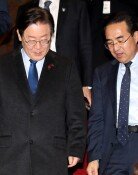Follow-up Measures are More Important for South Korea-Japan Treaty
Follow-up Measures are More Important for South Korea-Japan Treaty
Posted December. 28, 2004 23:06,
The government decided to disclose documents related to the 1965 South Korea-Japan Treaty, opening the door to solving the remaining questions of the modern history. Publication of the documents cannot be postponed forever as many people have raised questions over the process involved in reaching such an agreement. The government reluctantly decided to make the document public not voluntarily, but reluctantly, because of an administrative suit filed by a civil group. However, what matters more are the follow-up measures after the publication.
More than anything, the true nature of Korea-Japan negotiations and the way the two countries have handled Japans brutal colonial rule in the past should be made clear. Suspicions that the Korean government disgracefully participated in the dialogue and compromised with Japan for economic benefit should be dispelled at any cost. The Korean government decided to release 1,200 pages of documents including meeting records. However, I believe the government should publicize other documents as well, if necessary.
Victims of Japanese colonial rule over the Korean peninsula have insisted that the Korean government block individual reparations from the Japanese government. In addition, some people argued that the government received $800 million, including $300 million of free loans, $200 million in credit loans, and $300 million in commercial loans, but compensated only a few victims for the sake of formality. There is a huge gap between the arguments of the government, which insist they did its best, and the victims. Therefore, things should be made clear with the release of the document in question.
Though the issue is about what happened 40 years ago, it is still an embarrassing situation for the government. However, it is better late than never. Considering that the two countries reached the treaty despite fierce protests by Korean public at the time, the government should now tell the truth to the public. The government should admit to past wrongdoings, if there are any, and come up with adequate follow-up measures.
When the Korean government decided to release the documents, a Japanese newspaper reported that seven bereaved family members of a victim of Japanese colonial rule lost a lawsuit against Japanese government and failed to win compensation. Only when the Korean government makes its past clear will it be able to demand ethical and humanitarian responsibilities from Japanese government.







